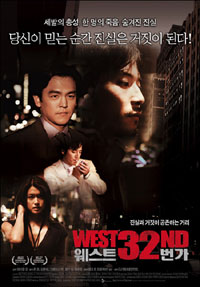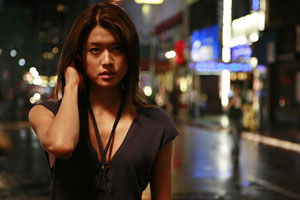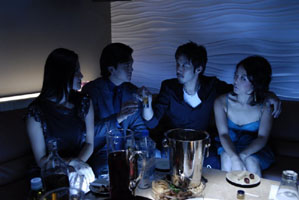Life is hot in K-Town. Jin-Ho, owner of a popular salon room club has recently been assassinated for unknown reasons and a young 14-year old named Kevin Lee has been picked up for the crime. Up-and-coming lawyer John Kim is assigned the case, and is taking it on pro bono, as his firm wants some positive publicity and a successful case would  also gain John partnership in the firm. After some digging around, he’s led to a local gang that Kevin used to run with and their leader Mike Juhn. While at first he gets nowhere, Mike eventually seems to take a liking to him and before he knows it, John is running around K-Town’s criminal underbelly and finding he actually enjoys it. All is not what it seems though, as cryptic messages begin to trickle his way courtesy of Jin-Ho’s top girl Suki, and soon John starts to wonder if he hasn’t gotten in over his head.
also gain John partnership in the firm. After some digging around, he’s led to a local gang that Kevin used to run with and their leader Mike Juhn. While at first he gets nowhere, Mike eventually seems to take a liking to him and before he knows it, John is running around K-Town’s criminal underbelly and finding he actually enjoys it. All is not what it seems though, as cryptic messages begin to trickle his way courtesy of Jin-Ho’s top girl Suki, and soon John starts to wonder if he hasn’t gotten in over his head.
During the opening minutes of West 32nd, there will be little doubt in your mind that you’re watching a Korean film. It looks like a Korean film, sounds like a Korean film, and is even produced by powerhouse Korean film studio CJ Entertainment. But soon enough, you’ll realize West 32nd was shot on American soil in New York City’s Koreatown with a mostly American crew. The film marks CJ Entertainment’s first foray into American moviemaking, and they should be absolutely commended for not sacrificing a thing and not succumbing to the pressures of Americanizing the story. Everything about West 32nd, outside of some of the locations and the English dialogue scenes, falls right in line with most other Korean gangster/crime films that have cropped up over the past decade. In fact, it resembles them so strongly that I have to wonder if it was produced in South Korea with all Korean actors if it would have stood out so strongly; the alien setting definitely separates it from the pack.
It’s pretty clear that director Michael Kang is a big fan of American crime cinema, especially the films of Martin Scorsese and Michael Mann; the influence on West 32nd is undeniable. But just like how the setting helps the film stand out from its Korean crime brethren, so does the Korean influence separate the proceedings from just being an homage to the American big boys. Take a Mean Streets-like premise, but infuse it with Korean culture and sensibilities, and you have a film that sets itself apart without being too “in the know” or overly gushing towards its  forbearers, a la a Quentin Tarantino flick. Kang molds a tried-and-true premise to his own liking, and creates something altogether engaging. Add in some wonderful cinematography, which includes some amazing single-shot compositions and expertly crafted action sequences, and you get a film that will certainly surprise the unassuming.
forbearers, a la a Quentin Tarantino flick. Kang molds a tried-and-true premise to his own liking, and creates something altogether engaging. Add in some wonderful cinematography, which includes some amazing single-shot compositions and expertly crafted action sequences, and you get a film that will certainly surprise the unassuming.
A lot has been made about John Cho headlining such a serious film, and while I wouldn’t say his performance will change anyone’s mind about his future in dramatic cinema, he’s not at all bad. While at first glance you get the sense he’s not trying very hard, creating a cold character that’s nearly impossible to penetrate and hard to root for, by the end you’ll realize it was a wise move on Cho’s part and perfect for John Kim’s true personality. To be quite honest, the real attraction in West 32nd is newcomer Jun-seong Kim (billed here as simply Jun Kim) as Mike Juhn, playing up a subtly deadly gangster looking to move up the ranks. The guy has serious talent and hopefully we’ll see more from him in the future.
When all is said and done, a complaint could be levied at West 32nd for being somewhat apathetic, resulting in the viewer feeling little sympathy for any character at all, but this is a callous, uncaring world where getting ahead by any means necessary and getting what you want is the most important goal for all involved, so in many ways West 32nd works flawlessly. It will leave you feeling cold, but not every film is supposed to send you home with a smile on your face. Fans of films like Mean Streets and Collateral should definitely take a trip down to K-Town.

Pathfinder Home Entertainment presents West 32nd on DVD in 1.85:1 anamorphic widescreen. While there’s no problem whatsoever with the print itself, which sports vibrant colors, decent black levels and no print damage, the decision to jam a 90 minute film on a disc with over 45 minutes of extra content wasn’t the wisest of decisions, resulting in a low bitrate and some noticeable artefacts; being non-progressive doesn’t help matters either. There’s nothing here that ruins the film or anything, but it’s clear the transfer could have looked better. Audio is available in Dolby Digital 2.0 stereo, and sounds just fine. Not sure if Pathfinder skimped on a 5.1 track like they’ve done on previous releases, but the stereo track fits nicely with a low-key film like this. Optional English subtitles for the Korean dialogue scenes are well displayed and free of errors.
First up in the extras department is “Getting Naked with Mike and Ed”, which is a 17-minute sit-down interview with writer/director Michael Kang and co-writer Edmund Lee. The two discuss the origins of the story, how they decided to work together, and their overall motivations. Michael Kang also provides a feature-length commentary (which Lee was supposed to appear on, but missed his flight for!) and goes into many of the same topics in greater detail. Six deleted scenes are also included, which feature nice director insight before each to give details on the intentions of the scenes and why the decision was made to cut them. Rounding out the extras are a short gag reel, a music video for the film’s theme “Leave Me to Dream” by Heather Park, and trailers for this and other Pathfinder releases.
Please feel free to discuss "West 32nd" here, in our forums!

